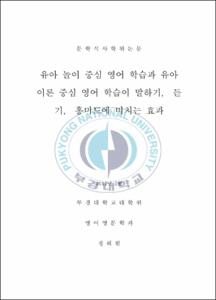유아 놀이 중심 영어 학습과 유아 이론 중심 영어 학습이 말하기, 듣기, 흥미도에 미치는 효과
- Abstract
- The purpose of this study is to examine the effects of a Play-Based Learning English Program on high, middle, low level's preschool students. After Play-Based Learning and Language-Based Learning were compared, learners' communicative comprehension in speaking, listening, and comprehension were examined according to their levels. An English learning center in Busan was chosen for the sample. Twenty four (24) five year old learners were chosen. The children were put into two groups. One group was observed under Play-Based Learning and the other under Language-Based Learning. Testing continued for four weeks, in twelve 30 minute periods. The same topics were used to test the effectiveness of the level-specific English teaching. There were post-test experiments. The post-test proved the findings. Play-based learning and Language-Based Learning were compared according to their levels. The post-test was conducted and the results for listening, speaking and comprehension according to their levels were observed.
For speaking, in high level students, the experimental group scored 9% higher than the comparative group's. In middle level students, the experimental group scored 13% higher than the comparative group's. In low level students, the experimental group scored 34% higher than the comparative group's.
For listening, in high level students, the experimental group scored 8% higher than the comparative group's. In middle level students, the comparative group scored 3% higher than the experimental group‘s. In low level students, the experimental group scored 34% higher than the comparative group's.
For interest, in high level students, the experimental group scored 8% higher than the comparative group's. In middle level students, the experimental group scored 33% higher than the comparative group's. In low level students, the experimental group scored 33% higher than the comparative group's.
In conclusion, low level students (Play-Based Learners) were found to improve speaking competence more than the comparative groups' high, middle students. Also low level students (Play-Based Learners) were found to improve listening competence more than the comparative groups' high, middle students. both low level and middle students (Play-Based Learners) showed more interest than the comparative groups' high students.
- Issued Date
- 2012
- Awarded Date
- 2012. 2
- Type
- Dissertation
- Publisher
- 부경대학교
- Department
- 대학원 영어영문학과
- Advisor
- 배재덕
- Table Of Contents
- 제1장.서론 1
1.1 연구의 필요성과 목적 1
1.2 연구과제 2
1.3 연구의 제한점 2
제2장.이론적배경 4
2.1 유아놀이의 특징 및 유아 영어 학습프로그램의 정의 4
2.1.1 유아놀이의 특징 4
2.1.2 언어중심 학습법 4
2.1.3 놀이중심 학습법 5
2.2 유아영어교수법 6
2.2.1 게임과 놀이 6
2.2.2 노래와 챈트 11
2.2.3 역할놀이 14
제3장.연구방법 19
3.1 연구참여자 19
3.2 연구도구 19
3.3 자료수집절차 21
3.3.1 영어수업 설계 및 실행 22
제4장.말하기,듣기,흥미도에관한효과 30
4.1 말하기에 관한 효과 30
4.2 듣기에 관한 효과 31
4.3 흥미도에 관한 효과 32
제5장.결론 및 제언 35
참고문헌 38
- Degree
- Master
- Files in This Item:
-
-
Download
 유아 놀이 중심 영어 학습과 유아 이론 중심 영어 학습이 말하기, 듣기, 흥미도에 미치는 효과.pdf
기타 데이터 / 482.8 kB / Adobe PDF
유아 놀이 중심 영어 학습과 유아 이론 중심 영어 학습이 말하기, 듣기, 흥미도에 미치는 효과.pdf
기타 데이터 / 482.8 kB / Adobe PDF
-
Items in Repository are protected by copyright, with all rights reserved, unless otherwise indicated.